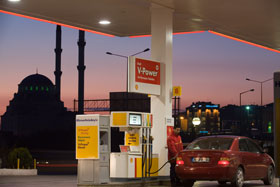Shell ends 92-octane petrol in Singapore
15 May 2009|11,110 views
 |
Shell claims that this will "enable them to enable to meet the growing demand from motorists for higher-octane main grade fuels, such as Shell Formula 95 and Shell Formula 98."
Motorists are also expected to benefit from greater fuel efficiencies with this move.
Henry Chu, General Manager, Retail Sales & Operations for Shell Eastern Petroleum, commented, "We recognise motorists' demand for quality fuel and savings, especially in the current economic situation. While we have seen many trading downwards from a higher-octane fuel to the next lower grade, this is not the case for 92-octane fuel."
"Demand for 92-octane fuel has remained flat at five per cent of Shell's total fuel volume. This figure has remained constant even when oil price was at its peak of almost US$147 per barrel last year. On the other hand, demand for our 95-octane and 98-octane main grade fuels has been growing."
He added, "There is also a misconception that the lowest-priced grade of unleaded petrol, that is 92-octane fuel, is the most economical. That is not necessarily the case. Shell's research and other studies have confirmed that adaptive engine management systems found in modern cars, such as knock sensors, lead to better fuel efficiency when higher-octane fuels are used."
A research paper published by the Society of Automotive Engineers in 2006, "The Impact of Gasoline Octane on Fuel Economy in Modern Vehicles", investigated and compared 91-octane and 95-octane fuels with respect to fuel efficiency.
The results showed that higher-octane fuels led to better fuel economy in all tested cars and in three different driving cycles. Fuel economy benefits varied from 0.9 to 4.3 per cent when switching from 91-octane to 95-octane fuel.
Demand for Shell Formula 92-octane fuel in Singapore has been consistently low for several years.
In a 2009 survey conducted by Shell on Singapore motorists' driving habits, it found that three times as many Singapore motorists are now conscious about their fuel efficiency compared to two years before. Eighty-three per cent were then willing to change their driving habits to save fuel, and over nine in 10 welcome more fuel-saving advice.
Shell has responded with a year-long programme to help drivers get the most out of their fuel. The website, www.shell.com.sg/everydrop was launched recently, awarding drivers with fuel vouchers upon completion of their "training" on how to save fuel.
 |
Shell claims that this will "enable them to enable to meet the growing demand from motorists for higher-octane main grade fuels, such as Shell Formula 95 and Shell Formula 98."
Motorists are also expected to benefit from greater fuel efficiencies with this move.
Henry Chu, General Manager, Retail Sales & Operations for Shell Eastern Petroleum, commented, "We recognise motorists' demand for quality fuel and savings, especially in the current economic situation. While we have seen many trading downwards from a higher-octane fuel to the next lower grade, this is not the case for 92-octane fuel."
"Demand for 92-octane fuel has remained flat at five per cent of Shell's total fuel volume. This figure has remained constant even when oil price was at its peak of almost US$147 per barrel last year. On the other hand, demand for our 95-octane and 98-octane main grade fuels has been growing."
He added, "There is also a misconception that the lowest-priced grade of unleaded petrol, that is 92-octane fuel, is the most economical. That is not necessarily the case. Shell's research and other studies have confirmed that adaptive engine management systems found in modern cars, such as knock sensors, lead to better fuel efficiency when higher-octane fuels are used."
A research paper published by the Society of Automotive Engineers in 2006, "The Impact of Gasoline Octane on Fuel Economy in Modern Vehicles", investigated and compared 91-octane and 95-octane fuels with respect to fuel efficiency.
The results showed that higher-octane fuels led to better fuel economy in all tested cars and in three different driving cycles. Fuel economy benefits varied from 0.9 to 4.3 per cent when switching from 91-octane to 95-octane fuel.
Demand for Shell Formula 92-octane fuel in Singapore has been consistently low for several years.
In a 2009 survey conducted by Shell on Singapore motorists' driving habits, it found that three times as many Singapore motorists are now conscious about their fuel efficiency compared to two years before. Eighty-three per cent were then willing to change their driving habits to save fuel, and over nine in 10 welcome more fuel-saving advice.
Shell has responded with a year-long programme to help drivers get the most out of their fuel. The website, www.shell.com.sg/everydrop was launched recently, awarding drivers with fuel vouchers upon completion of their "training" on how to save fuel.
Latest COE Prices
August 2025 | 1st BIDDING
NEXT TENDER: 20 Aug 2025
CAT A$102,009
CAT B$123,498
CAT C$70,001
CAT E$122,334
View Full Results Thank You For Your Subscription.
















